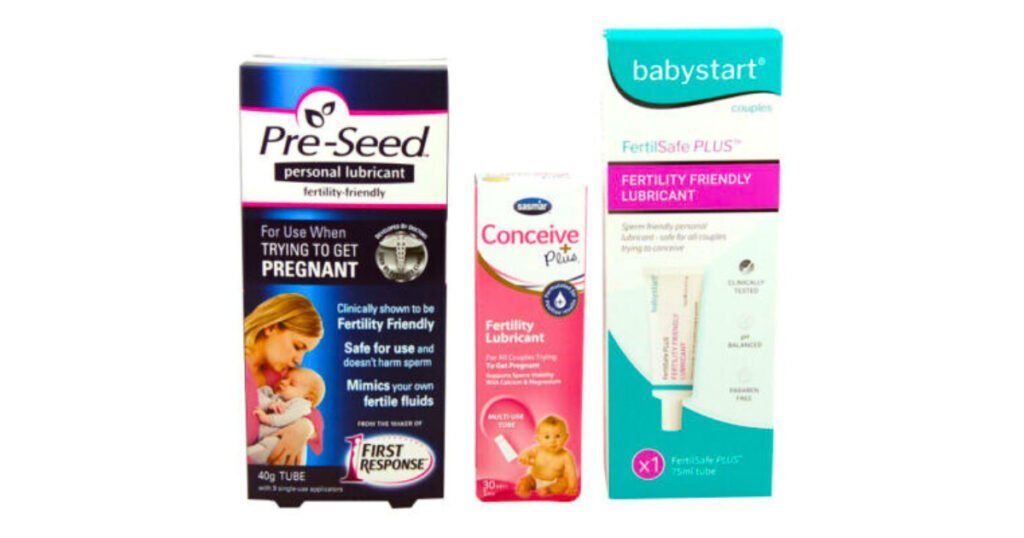Last Updated on 10 February 2024
UPDATED 07 FEBRUARY 2024
When trying to conceive, couples often overlook the role that lubricants play in fertility. Choosing the right lube to increase fertility can significantly impact your journey. In this article, we will explore the importance of fertility-friendly lubes and how they can increase your chances of conception. We will also delve into the different types of lubricants, their ingredients, and the impact they can have on sperm health. In the end, you will have a better understanding of why fertility-friendly lubricants are essential for couples trying to conceive.
- Understanding Lubricants: An Overview
- The Relationship Between Lubricants and Conception
- The Importance of Fertility-Friendly Lubes
- Choosing the Right Lubricant for Conception
- Common Misconceptions About Lubricants and Fertility
- Frequently Asked Questions
- What lube is safe when trying to conceive?
- How do I know if my lube is fertility-friendly?
- Is fertility-friendly lube necessary?
- How does lube affect fertility?
- What Is the Best Lube for Fertility?
- What makes a lube fertility-friendly?
- Why does regular lube hinder fertility?
- Why use lube while trying to conceive?
- Is water-based lubricant safe for conception?
- What Should I Look for in fertility-friendly lubes?
- How does fertility-friendly lubes differ from regular lubricants?
- Are there any side effects to using fertility-friendly lubes?
- How often should I use fertility-friendly lubes in order to improve my chances of conceiving?
- Is it safe to use a fertility-friendly lubricant with condoms or other forms of birth control?
- How do you choose the best fertility-friendly lubricant for you and your partner?
Understanding Lubricants: An Overview
Lubricants are products designed to reduce friction during intercourse. They can be especially beneficial for couples experiencing vaginal dryness or discomfort during intimacy. Viscosity and consistency of lubes are essential factors when choosing a lubricant that is safe for conceiving. Lubes that promote fertility should mimic the natural lubrication of the vagina to create a comfortable and pleasurable experience for both partners.
The Role of Lubricants in Intercourse
Using lubricants can enhance the overall comfort and pleasure of intimacy by reducing friction during intercourse. This is particularly important for couples who may be trying to conceive, as discomfort during intercourse can lead to a reduced frequency of intercourse. Lubricants create a protective environment for sperm in the vagina, helping to maintain the natural pH of the vagina, which is crucial for fertility. Quality lubricants mimic the natural cervical mucus, aiding sperm function and creating quality cervical fluid for the sperm’s motility.

Different Types of Lubricants and Their Ingredients
Several types of lubricants are available, each with its own set of ingredients. Water-based lubricants are the most common and widely recommended for trying to conceive. They are safe for use with condoms and do not interfere with sperm motility. On the other hand, silicone-based lubricants are known for their long-lasting properties. They should be used with caution when trying to conceive, as they can create a barrier that hinders sperm movement. Oil-based lubricants should also be avoided when trying to conceive, as they can damage the sperm and increase the risk of infection.
Some lubricants may contain additional ingredients, such as fragrances or preservatives, which can potentially harm sperm. Opting for lubricants free from parabens, glycerin, and spermicides is best, as these ingredients can negatively impact fertility. Look for lubricants that are specifically designed for trying to conceive, as they have undergone rigorous testing to ensure they are safe for sperm function and fertility.
The Relationship Between Lubricants and Conception
Choosing the proper lubricant is crucial when trying to conceive, as some lubricants can hinder sperm health and motility. Using fertility-friendly lubes for conception is essential, as using the wrong lubricant can decrease the chances of fertilization. We will delve deeper into the science behind lubricants and fertility to help you make an informed choice for your fertility journey.
How Common Lubricants Can Impact Sperm Health
The use of common lubricants can have a significant impact on sperm health. Many commercial lubricants on the market contain ingredients that can be harmful to sperm function and motility. Some lubricants with fragrances or spermicides can be detrimental to conception, as they can alter the pH balance of the vagina, affecting sperm motility. Additionally, certain lubricants with high viscosity or ingredients like glycerin can reduce sperm motility and increase the risk of DNA damage. It is crucial to choose a lubricant that is safe for sperm and fertility when trying to conceive to increase the chances of fertilization.
The Science Behind Lubricants and Fertility
Understanding the science behind lubricants and fertility can help shed light on their impact on conception. Fertility-friendly lubes help to create a conducive environment for sperm movement, ensuring that they can reach the fallopian tubes to fertilize the egg. The consistency and pH of the lubricant play a critical role in sperm function and fertility. They help to mimic the natural cervical mucus, providing sperm with a protective environment and aiding in their motility. Furthermore, magnesium ions in some lubricants can support sperm motility and function. Thereby increasing the chances of successful fertilization. Couples can optimize their fertility and increase their chances of conceiving by choosing the right lubricant.
The Importance of Fertility-Friendly Lubes
Now that we understand the impact of lubricants on fertility, let us delve into the importance of using fertility-friendly lubes when trying to conceive. Fertility-friendly lubes are specifically formulated to support sperm function and increase the chances of conception. They are free from harmful ingredients that can hinder sperm motility and viability, such as parabens and glycerin. These lubricants are designed to maintain the natural pH of the vagina and mimic fertile cervical fluid, creating an optimal environment for sperm to navigate and fertilize the egg.
What Makes a Lubricant Fertility-Friendly?
A fertility-friendly lubricant is one that supports sperm motility, promotes a fertile environment, and is safe for use when trying to conceive. These lubricants are specially formulated to mimic the natural cervical mucus, aiding sperm movement and function. They have the right consistency to reduce friction during intercourse, resulting in enhanced sperm motility. Additionally, fertility-friendly lubricants maintain the optimal pH balance of the vagina, which is crucial for fertility. By choosing a lubricant that is fertility-friendly, couples can increase their chances of conception and optimize their fertility journey.
Meeting the Requirements for a Sperm-Friendly Lubricant
When trying to conceive, it is important to choose a lubricant that meets the requirements for sperm friendliness. Opt for lubricants that are regulated by the Food and Drug Administration (FDA). These lubricants are specifically designed to support sperm motility and function without hindering the fertilization process. They provide a protective environment for sperm cells by promoting their ability to navigate the reproductive system and fertilize the egg.
Choosing the Right Lubricant for Conception
Now that you understand the importance of fertility-friendly lubricants, let us discuss how to choose the right lubricant for conception. Timing is key when trying to conceive, and using the right lubricant during the fertile window can increase the chances of fertilization. If you do not know the days you are most fertile, you can estimate your ovulation date here. If you are undergoing fertility treatments or taking fertility medications, it is important to consult with your healthcare provider to ensure that the lubricant you choose is safe to use in conjunction with your treatment plan.
How to Identify Potential Harmful Ingredients in Lubricants
To ensure that you are choosing a safe lubricant for conception, it is essential to know how to identify potential harmful ingredients. Always check the ingredients of all lubricants before use. Some lubricants contain parabens, which have been linked to hormonal imbalances that affect fertility. Glycerin is another ingredient to watch out for, as it can disrupt the natural pH balance of the vagina and hinder sperm motility. It is best to opt for lubricants that are pH-balanced and free from toxins, fragrances, and spermicides.
Recommended Fertility-Friendly Lubricants
Now that we have explored the importance of fertility-friendly lubricants, let us take a quick look at some of the best options available. When choosing a fertility-friendly lubricant, it is essential to consider factors such as sperm motility, pH balance, and fertility-friendliness. Some of the top fertility-friendly lubricants recommended by fertility experts are:

Pre-Seed is a popular lubricant that is specifically formulated to support sperm function and is safe for use when trying to conceive.
Conceive Plus is another fertility-friendly lubricant that helps to mimic the natural cervical fluid, promoting a fertile environment for sperm.
Lube Life is a water-based lubricant that is designed to increase fertility and provide additional lubrication for comfortable intercourse.
Common Misconceptions About Lubricants and Fertility
There are several misconceptions surrounding lubricants and fertility that need to be addressed. One common misconception is that lubricants are not necessary when trying to conceive. Using a fertility-friendly lubricant can enhance sperm movement and increase the chances of fertilization. This is especially true for couples dealing with male infertility or vaginal dryness. Another misconception is that all lubricants are created equal. Commercial lubricants, in particular, may contain ingredients that can hinder fertility and sperm function.
Using other oils, such as coconut oil or baby oil, as lubricants is not recommended when trying to conceive. While these oils may seem like natural alternatives, they can be detrimental to sperm health and fertility. Oil-based lubricants can damage sperm, affecting their motility and ability to fertilize the egg. It is best to use fertility lubes that are specifically designed to support sperm function and are safe for use when trying to conceive. Fertility-friendly lubricants provide a protective environment for sperm, aiding in fertilization and increasing the chances of conception.
Fertility-friendly lubes: helpful or marketing hype?
Fertility-friendly lubricants have gained popularity in recent years, but are they truly helpful or just marketing hype? According to fertility experts, fertility-friendly lubricants can indeed be helpful for couples trying to conceive. Unlike regular lubricants, fertility lube is specifically formulated to support sperm function, increase sperm motility, and create a fertile environment for conception. While there may be marketing buzz around fertility-friendly lubricants, the underlying science and research behind these products is solid. Fertility lubricants are carefully crafted to optimize sperm health and increase the chances of fertilization, making them a valuable tool for couples on their fertility journey.
Can fertility lube help you get pregnant?
Yes, fertility lube can help increase your chances of getting pregnant. Fertility-friendly lubricants are specifically formulated to support sperm function and increase sperm vitality, optimizing the chances of conception. These lubricants create a fertile environment, mimicking the natural cervical mucus, which aids sperm motility and survivability. By providing the right conditions for sperm to fertilize the egg, fertility lube can increase the likelihood of conception. It is important to choose a fertility-friendly lubricant that is safe for use when trying to conceive to ensure the best possible chances of success.
Understanding the importance of fertility-friendly lubricants is crucial for couples trying to conceive. While lubricants are not a necessity when trying to conceive, using a fertility-friendly option can contribute positively to your fertility goals. To help you make an informed choice, we have compiled a list of recommended fertility-friendly lubricants for you to consider. Remember, every couple is unique, so finding the right lubricant that suits your needs is essential.
Frequently Asked Questions
What lube is safe when trying to conceive?
When trying to conceive, it’s important to choose a lube that is safe and fertility-friendly. Opt for water-based lubricants without glycerin, parabens, or spermicides. Look for pH-balanced options that mimic cervical mucus, such as Pre-Seed and Conceive Plus.
How do I know if my lube is fertility-friendly?
To ensure your lube is fertility-friendly, look for labels indicating sperm-safe or fertility-friendly. Avoid harmful chemicals like glycerin and parabens. Check the pH level to ensure it’s suitable for sperm survival. Consider using natural options like Pre-Seed designed specifically for fertility.
Is fertility-friendly lube necessary?
Fertility-friendly lube isn’t always necessary, but traditional lubes can hinder sperm motility and fertility. When trying to conceive, using a fertility-friendly lube may increase your chances of success. These lubes are usually pH-balanced and free from harmful chemicals.
How does lube affect fertility?
Regular lubricants may contain ingredients that harm sperm. Fertility-friendly lubes mimic natural fluids and support sperm health, increasing your chances of conceiving. Just remember to use any lube in moderation, as excessive use can decrease fertility.
What Is the Best Lube for Fertility?
When it comes to fertility, using a lube specifically labeled as “fertility-friendly” is crucial. Look for lubes with a pH balance similar to the vaginal environment, and avoid those with harsh chemicals or fragrances that could harm sperm health. Popular options include Pre-Seed, Conceive Plus, and Lube Life.
What makes a lube fertility-friendly?
To ensure a lube is safe for fertility, avoid those with spermicides or harmful chemicals. Opt for water-based lubricants with a pH level close to the vagina’s natural acidity. Look for fragrance-free, dye-free options and consider ingredients like vitamins C and E, aloe vera, and green tea extracts.
Why does regular lube hinder fertility?
Regular lubricants can hinder fertility because they may contain chemicals harmful to sperm. Additionally, high pH levels in some lubes can affect sperm motility. These lubricants can also alter the natural vaginal pH, making it difficult for sperm to survive. Fertility-friendly lubes mimic bodily fluids and support sperm survival and motility.
Why use lube while trying to conceive?
Using lube while trying to conceive can enhance comfort and pleasure during intercourse, potentially increasing the chances of conception. Some fertility-friendly lubes mimic cervical mucus, facilitating sperm movement. Additionally, certain fertility treatments require the use of lube, ensuring optimal conditions for the union of sperm and egg.
Is water-based lubricant safe for conception?
Water-based lubricants are safe for conception as they do not harm sperm or hinder their movement. Fertility-friendly lubricants mimic natural cervical mucus, aiding in conception. Avoid oil-based lubricants that can harm sperm when trying to conceive.
What Should I Look for in fertility-friendly lubes?
When choosing lubricants, it’s important to look for those that are pH-balanced and free from harmful chemicals. Opt for water-based options, as they don’t interfere with sperm motility. Avoid fragrances or flavors that can irritate the vaginal area. Some lubricants may contain natural ingredients like aloe vera or vitamin E for added benefits.
How does fertility-friendly lubes differ from regular lubricants?
Fertility-friendly lubricants differ from regular lubricants in several ways. They mimic cervical mucus, creating a sperm-friendly environment. Regular lubricants can hinder sperm motility and survival. Fertility-friendly lubes have a pH level compatible with sperm and are free of harmful chemicals. Some even contain ingredients like hyaluronic acid to increase the chances of conception.
Are there any side effects to using fertility-friendly lubes?
Fertility-friendly lubricants are generally safe to use and do not have any significant side effects. However, it’s important to note that some individuals may experience mild irritation or allergic reactions to certain ingredients. Always check the ingredients list before purchasing a fertility-friendly lubricant and discontinue use if you experience any discomfort or adverse reaction.
How often should I use fertility-friendly lubes in order to improve my chances of conceiving?
It is recommended to use fertility-friendly lubricants sparingly when trying to conceive. Using them during ovulation can increase the chances of conception. Consult your healthcare provider for personalized recommendations on the frequency of use.
Is it safe to use a fertility-friendly lubricant with condoms or other forms of birth control?
Using a fertility-friendly lubricant with condoms or other forms of birth control is generally safe. However, always check the label for compatibility with your chosen method. Some lubricants may damage latex condoms or diaphragms, reducing their effectiveness. Consult with a healthcare provider before using any new product for fertility or birth control purposes.
How do you choose the best fertility-friendly lubricant for you and your partner?
When choosing a fertility-friendly lubricant, avoid those with harmful chemicals or spermicides. Opt for a pH-balanced option similar to the vagina’s natural pH level. Water-based lubricants are generally better for sperm motility. Consider consulting your doctor or fertility specialist for personalized recommendations.
Author Biography









